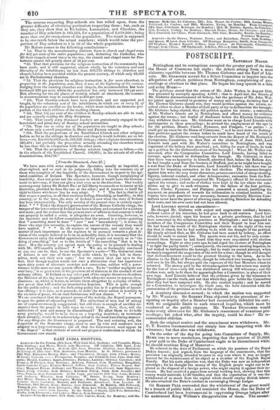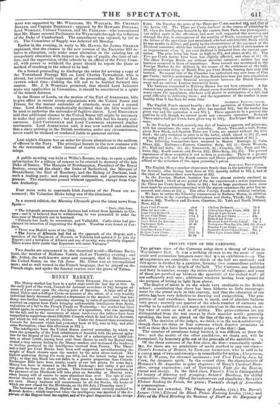POSTSCRIPT.
SATURDAY NIGHT.
Nottingham and its corruptions occupied the greater part of the time the House of Commons last night ; the debate arising from a most Nottingham and its corruptions occupied the greater part of the time the House of Commons last night ; the debate arising from a most elaborate squabble between Mr. Thomas Gisborne and the Earl of Lin- coln. Mr. GISBORNE moved for a Select Committee to inquire into the allegations of certain petitions from Nottingham, complaining of pro- ceedings at elections in that place. He began his long speech in a thin and noisy House— The petitions stated that the return of Mr. John Walter, in August 1842, was procured by corruptly spending 4,000/. ; that in April last, the friends of Mr. Gisborne discountenanced all bribery, but the partisans of Mr. John Wal- ter junior again resorted to promises of money and treating, declaring that if Mr. Thomas Gisborne should win, they would petition against the return, re- solved either to elect a Member of their party or try to disfranchise the borough: Mr. Gisborne being elected, they did petition against his return ; a committee of Mr. Walter's friends sat in Nottingham, and offered money for evidence against the return ; but fearful of disclosure before the Election Committee, they withdrew their case. Mr. Gisborne went on to charge Lord Lincoln with participation in these proceedings: he advised the employment of the agells for the petition, Messrs. Clarke, Fynmore, and Fladgate, " as parties t Jo could get up cases for the House of Commons; " and he sent down to Notting. ham petitions against the return before he could have heard of the result of the election. Mr. Gisborne read long extracts from the Report of Mr. Roebuck's Compromise Committee, to show that at the election of June 1841, Lord Lincoln took part with Mr. Walter's committee in Nottingham, and was cognizant of the bribery then practised; yet, failing for want of funds, he took up a petition for the disfranchisement of the borough ! When Mr. Walter was unseated, after the Compromise Committee, Lord Lincoln, having failed to corrupt, again wanted to disfranchise the borough. Mr. Gisborne, to show that there was no hypocrisy in himself, admitted that, before the Reform Act, he had bought a seat from the freemen of Stafford, just as he might have bought a seat from the Duke of Newcastle, Lord Lincoln's father ; but there was no ground for imputing corruption to his last election. The witnesses brought against him were the very worst characters, persons convicted of sheep-stealing, bigamy, indecent conduct, and other delinquencies; emissaries from the Not- tingham committee (which comprised Mr. Fladgate) offered 2/. for statements against the return; and sacks of clothes were kept at the inn where the com- mittee sat to give to such witnesses. On the failure of the first petition, Messrs. Clarke, Fynmore, and Fladgate, presented a second, justifying the payment, on precedents of rewards for information in criminal matters. An inquiry into such practices was necessary, because practically Election Com- mittees never have the power of allowing costs to sitting Members for defending their seats, and his own costs bad not been allowed.
Lord ,Lizqcomq moved an amendment— He charged Mr. Giaborne with unjust and ungenerous conduct; because, without notice of his intention, he had gone back to old matters. Lord Lin- coln, however, denied, upon his honour as a private gentleman, that he had been concerned in the nefarious practices at Nottingham ; and he appealed to members of the Compromise Committee and their Report to bear him out. He had heard the result of the Nottingham election on the night of the very day that it closed, but he had nothing to do with the draught of the petition. He simply advised that, as Mr. Gisborne had been seated by bribery, an effort should be made to unseat him. The agents were not his, and he only recom- mended them because he had heard that they were acquainted with election proceedings. Eight or nine years ago, be had urged the electors of Nottingham "to fight the purity battle "; subsequently, the corruption seeming hopeless, he had wished to disfranchise the borough; but he made no second attempt, when he merely supported the suspension of the writ for a time ; though he still thought that disfranchisement would he the greatest blessing to the town. As to the allusion to the Duke of Newcastle, though he inherited two boroughs, he never sold one in his life, but always paid the expenses of the four Members whom he returned. The money paid to the witnesses against the last return was merely for the loss of time—only 601. was distributed among 100 witnesses; and the clothes were only to fit them for appearingbefore a Committee, in place of their own rags. Lord Lincoln believed that the evidence given by the witnesses in Nottingham was the truth, and not that which they gave before the Committee after they had been tampered with. He also courted inquiry ; and he moved for a Committee to investigate the whole case, the facto connected with the presentation of the petitions as well as the elections.
A desultory discussion ensued ; in which the motion was supported by Mr. WALLACE. Sir ROBERT PEEL objected to the precedent of re- opening an inquiry after a Member had successfully defended his seat ; with no assignable limits to such renewed inquiries, which must be conducted at the public expense. Mr. Tnomes DUNCOMBE would make every allowance for Mr. Gisborne's resentment of vexatious pro- ceedings; but asked what, after the inquiry, could be done ? He re- commended oblivion.
Both the original motion and the amendment were withdrawn. Mr. F. T. lieuinn recommended one simply into the tampering with the witnesses ; but that also was withdrawn.
On the order of the day for going into Committee of Supply, Mr. RUNE rose to move resolutions, importing that the pension of 21,000/. a year paid to the Duke of Cumberland ought to be discontinued while he should continue King of Hanover—
He referred to the Acts of Parliament on which the pensions of the Royal Dukes depend ; and argued, from the language of the enactments, that the
provision was originally intended to cease in any case where it was no longer wanted for the maintenance of its object as a member of the English Royal Family. But his main objection was, that the Duke was now an independent
sovereign ; for he thought the money of the English people ought not to be
placed at the disposal of a foreign power, who might employ it against their in- terests. He had received a_paper tram several working men, showing that this money would maintain 1,050 families, and that the exportation of it was the withdrawal of so much from the capital which should employ British labour. He also attacked the Duke's conduct in encouraging Orange Lodges.
Sir ROBERT PEEL contended that the withdrawal of the grant would be a breach of public faith ; and reminded the House, that the Duke of
Cumberland had been instrumental in I uppressing Orange lodges after he understood King William's disapprobation of them. The amend-
ment was supported by Mr. WILLIAMS, Mr. WALLACE, Mr. CHARLES BULLER, and Captain BERKELEY; opposed by Sir HOWARD DOUGLAS, Lord WORSLEy, Colonel VERNER, and Mr. FERRAND—who remembered that Mr. Hume entered Parliament for Weymouth through the influence of the Duke of Cumberland. The amendment was rejected, by 197 to 91. The Committee of Supply was deferred till Monday.
Earlier in the evening, in reply to Mr. HAWES, Sir JAMES GRAHAM explained, that the clauses in the new version of the Factories Bill re- lative to education, only make some alteration in the existing law of compulsory education with respect to the age of pupils, the time of tui- tion, and the supervision of the schools by an officer of the Privy Coun- cil, with power to withhold the grant should he report the place or method of teaching in the school to be bad.
On a formal proceeding to discharge the order for serving a copy of the Townshend Peerage Bill on Lord Charles Townshend, who is abroad, but notoriously cognizant of the proceeding, the Earl of LEI- CESTER asked time ; wishing the bill not to be hurried forward this session. Mr. J. S. WORTLEY promised, that should Lord Leicestet make any application in Committee, it should be considered in a spirir of the utmost fairness.
In the House of Lords, on the motion of the Earl of ABERDEEN, bills to give effect to recent treaty•stipulations with the United States and France, for the mutual surrender of criminals, were read a second time. Lord Aberdeen emphatically declared that the bills would not be used to authorize the surrender of fugitive slaves. Lord BROUGHAM said that additional clauses in the United States bill might be necessary to make that point clearer ; but generally the bills had his hearty con- currence. Lord COTTENHAM and Lord CAMPBELL expressed similar sentiments. Lord ASHBURTON said, it was now settled and admitted that a slave arriving in the British territories, under any circumstances, never could be claimed or rendered liable to personal service.



























 Previous page
Previous page